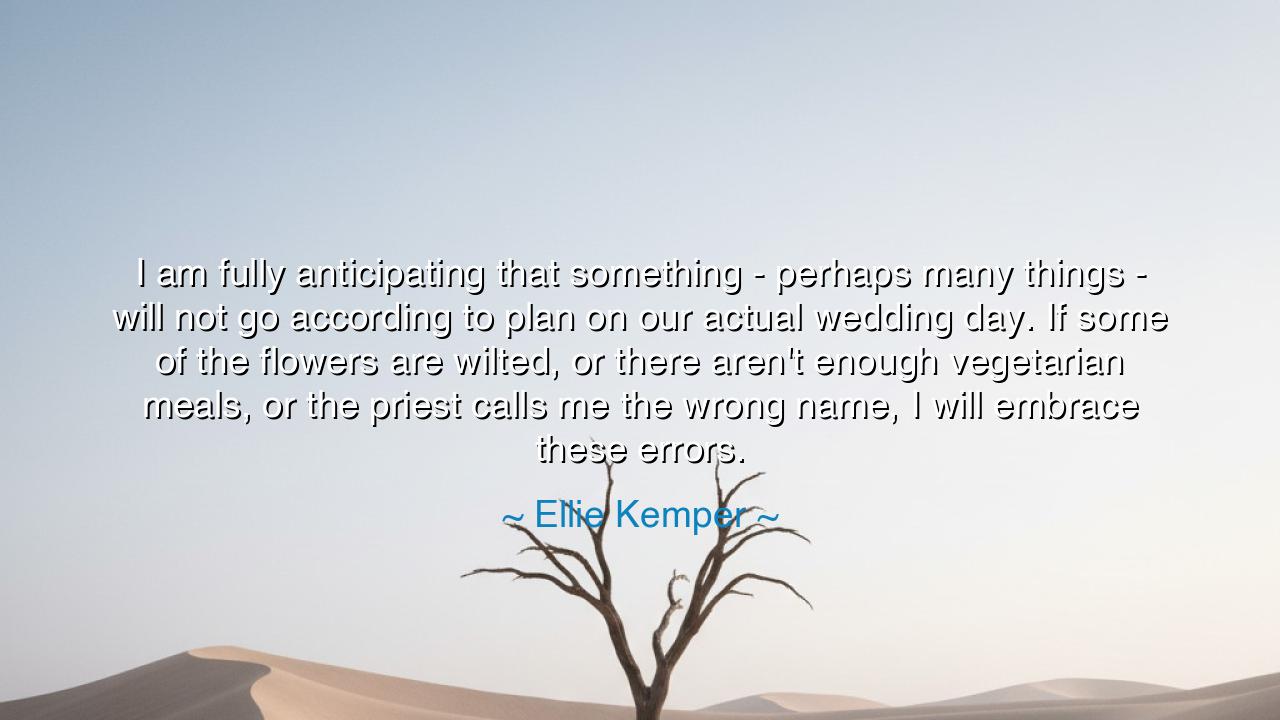
I am fully anticipating that something - perhaps many things -
I am fully anticipating that something - perhaps many things - will not go according to plan on our actual wedding day. If some of the flowers are wilted, or there aren't enough vegetarian meals, or the priest calls me the wrong name, I will embrace these errors.






In the words of Ellie Kemper—“I am fully anticipating that something—perhaps many things—will not go according to plan on our actual wedding day. If some of the flowers are wilted, or there aren't enough vegetarian meals, or the priest calls me the wrong name, I will embrace these errors.”—there is a spirit of humility and wisdom. She acknowledges that in moments we most desire to be perfect, imperfection will surely arrive. Yet rather than despair, she chooses acceptance, even joy, declaring that the heart of the wedding day lies not in flawless detail, but in the enduring covenant of love.
The ancients spoke of this same truth in parable. When the builders of the Tower of Babel sought perfection and power without limit, their plans were scattered, and their language confounded. Yet from this scattering came the diversity of nations and tongues. So too Kemper teaches: what we call “errors” may hold unexpected beauty, reminding us that control is not the true aim of life. It is not the plan but the love within it that gives a day its meaning.
Her words also call us to embrace imperfection as part of the human condition. For what is wilted may still carry fragrance, and a forgotten name may yet bring laughter. The great Japanese masters of wabi-sabi found beauty in the broken, the incomplete, and the imperfect. They understood that cracks in pottery, mended with gold, often made the vessel more beautiful than if it had never been broken at all. So it is with the wedding day, and with life: flaws are not failures, but threads of humanity woven into the fabric of joy.
History gives us many examples. When Alexander the Great was crowned at Babylon, the omens and rituals were marred by errors and confusion. His priests feared the gods would be angered, yet Alexander pressed forward, and his reign became legend. The ceremony was imperfect, but the destiny remained intact. Likewise, Kemper’s wisdom is that the vow, not the accident, holds eternal weight.
Thus, let this teaching endure: no day of joy must be perfect to be sacred. Flowers may wilt, meals may be forgotten, names may be mistaken, but the heart of the matter—the union of two souls—remains untouchable. To embrace errors is to embrace life itself, for in imperfection lies laughter, humility, and truth. And those who can welcome flaws on their wedding day will be well-prepared to welcome them in the long journey of marriage.






BTThu Bui T
Ellie Kemper’s attitude towards potential wedding mishaps is both humorous and wise. It reminds me that sometimes the best moments are the ones that are unplanned or imperfect. Do we let our expectations overshadow the joy of the day? Would embracing a little chaos actually make the wedding experience more fun and less about perfection?
TLDao thanh long
Ellie Kemper's quote brings an interesting perspective on weddings. We often get so focused on ensuring everything goes right, but sometimes embracing the unexpected can lead to the most authentic experiences. Is it possible to let go of the pressure to have everything perfect? Would weddings (and life) be less stressful if we just accepted that things might go wrong and roll with it?
TLNguyen Thi Linh
I admire Ellie Kemper’s laid-back attitude about her wedding day. It’s so easy to get caught up in the small details, but her perspective reminds us that things will never be perfect—and that’s okay. How often do we let tiny mishaps steal our joy during important moments? Shouldn't we focus on the bigger picture, like the love and commitment being celebrated, rather than sweating the small stuff?
DNDo Ngan
Ellie Kemper’s approach to weddings is refreshing! She embraces the inevitable imperfections that come with such a big event. It’s a great reminder that perfection isn’t the goal; the celebration is what matters. Why do we put so much pressure on ourselves for things to go exactly as planned? Can we learn to enjoy the chaos and unexpected moments that make life—and weddings—more memorable?